|
Kilgore Family The
Kilgores were in the news many times in the last three decades of the 19th
century, and it was not always for making bricks or building houses.
In late November of 1876, S. C. Kilgore was assaulted by a "negro," who was convicted a few months later and sentenced to two years in the penitentiary. [Denison Daily Cresset, Saturday, April 7, 1877, pg. 4] Subsequent news stories about S. C. and his two sons raise the question of whether the assault may have been provoked. In July 1888 the older son, Thomas E. "Ed" Kilgore (1866-1897), killed a man in Ladonia, a little town southeast of Bonham in Fannin County.  In
the spring of 1889 Ed was convicted of manslaughter and sentenced
to two years in the penitentiary. In October of that year his younger
brother, Wert B. Kilgore (1868-1919), was fined $14.25 for aggravated
assault in Denison. Two months later Ed Kilgore was pardoned by
the governor, after serving six months of his two-year sentence,
based on the governor's opinion that the eveidence in the case was
conflicting and even "untrue" thus it was "a proper case for executive
clemency."
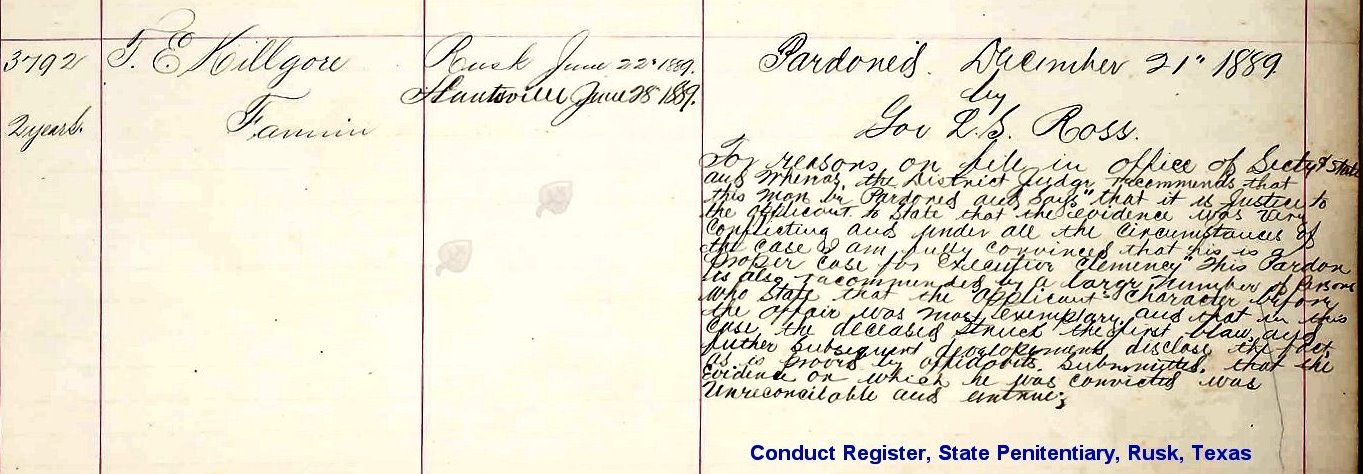 A
few months after the troublesome affairs with his sons, the barn on the
Kilgore's property accidentally burned.
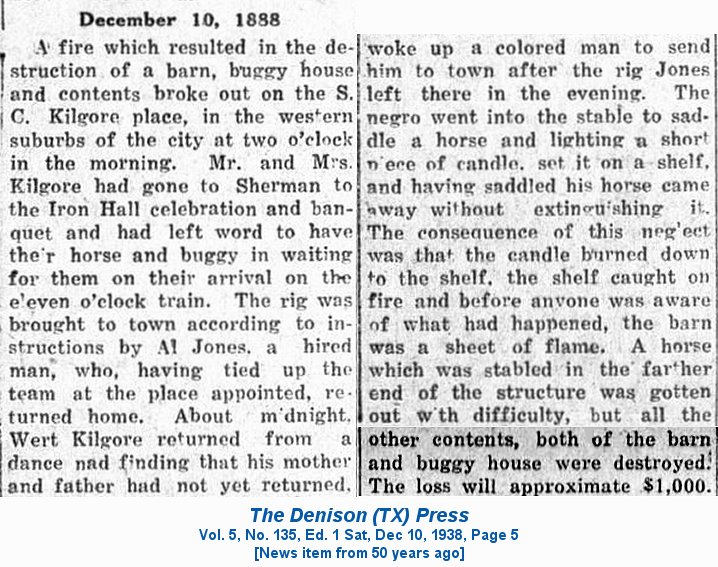 Ed
had been engaged to Fannie Jackson, daughter of a prominent family in Ladonia.
Fannie had lobbied hard for Ed's early release from prison. But by
the time he arrived back in Ladonia to marry her, she had changed her mind
about marrying him. Ed's reaction to her rejection was to spend the next
several years impugning the chastity of Fannie and her younger sister
to anyone around town who would listen. After simmering for seven years,
Fannie decided she had endured enough. She went gunning for Ed. She
hit him with five out of six shots from her revolver. Her brothers added
four or five more, and Ed expired from the aggregate effects of the bullet
holes. As she fired the last shot into his prone body, Fannie was heard
to exclaim, "You coward, you have slandered me long enough!"
Public sentiment around Ladonia was that Ed's killing was long
overdue, and no one was ever convicted of it. The story of the shooting
was a sensation in newspapers across the country.
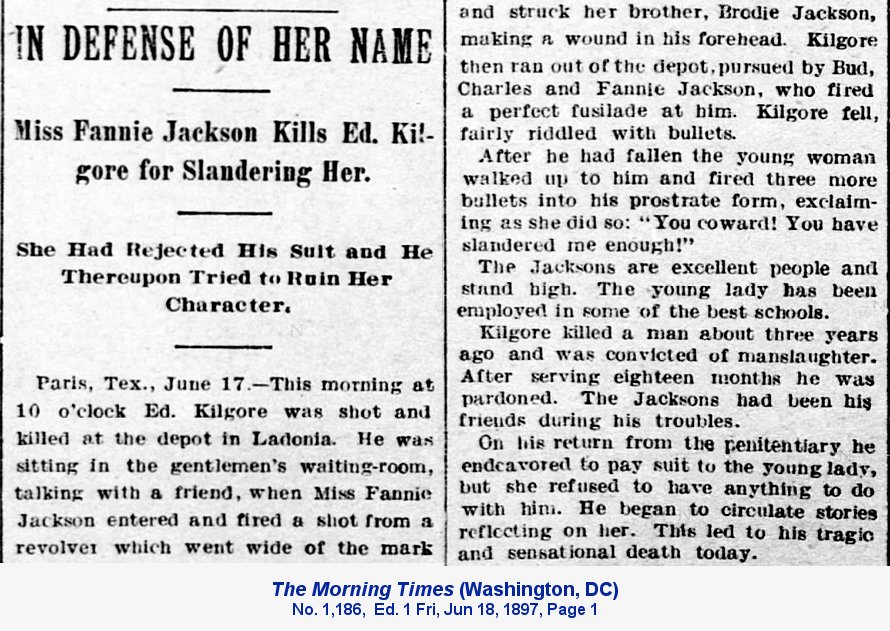 A
week later, Miss Jackson along with her brothers were placed under a
bond of $1,500 each, which was quickly paid. On August 30,
Fannin
County Attorney A.J. Nichols sent a letter to Addie Kilgore informing
her that Miss Jackson and her four brothers had been indicted on first
degree murder charges for the murder of her son, Ed. [The Sunday
Gazetteer,
September 5, 1897, pg. 4] Just over a month later the jury in
the
case of Texas vs, Miss Fannie Jackson, father and brothers was
discharged on account of a hung jury; ten of the jury members had been
in favor of convicting Miss Jackson although all were voted to
discharge the father and brothers. [The
Sunday Gazetteer, October 10, 1897, pg. 1] Miss Fannie Jackson did later marry and died in 1925.
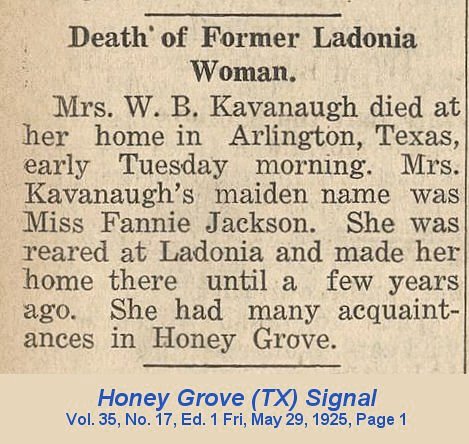 In
1898, a year after the Jackson family killed Ed, his father and
surviving brother were involved in a "row" in Durant, Indian Territory.
Fines of $20 and $10 were levied against S.C., age 60, and Wert, age 30, respectively. [The Sunday Gazetteer,
August 24, 1898, pg. 3] The following year Wert was fined again
for assault and robbery of a young farm boy who had ridden the train
with him into Denison from the west, amongst other incidences of
violence and lawlessness.
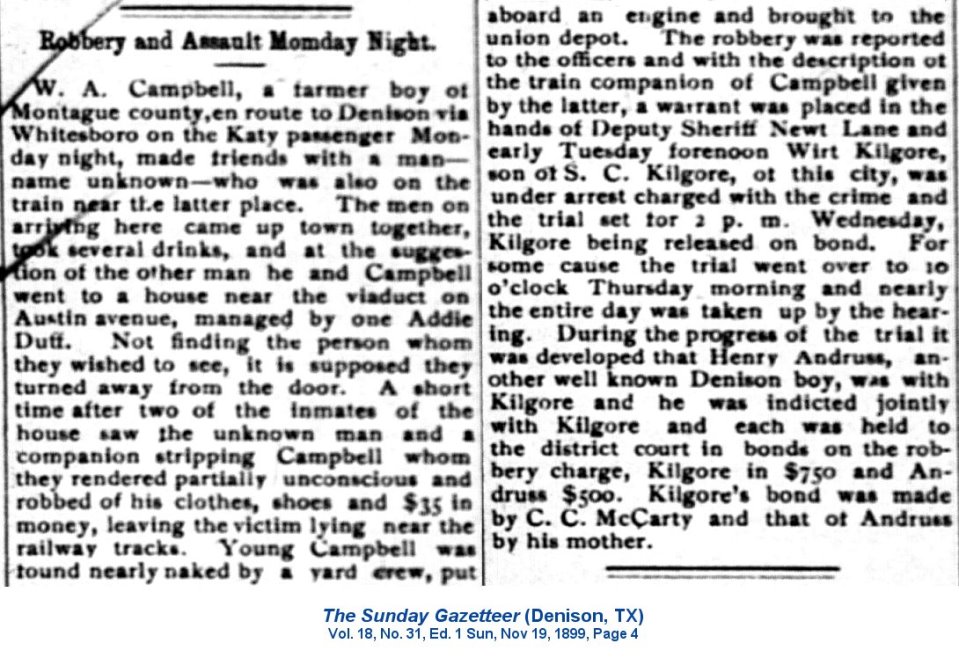  1899
was also the year that S. C. Kilgore was stricken with paralysis,
unable to "articulate." He applied
for a Confederate veteran's pension. The application was denied, because
he owned too much property to qualify as an indigent. After his death
in 1902, he was praised in his obituary as a pioneer citizen, responsible
for building "many of the substantial business and resident
houses of Denison" with "brick supplied from his own yards."
 Crime & Punishment Biography Index Susan Hawkins © 2024 If you find any of Grayson CountyTXGenWeb links inoperable, please send me a message. |